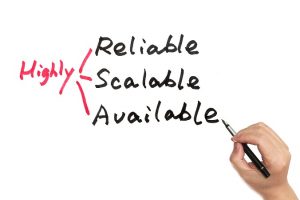Will your ERP solution grow with you?
If you’re thinking of upgrading your ERP (Enterprise Resource Planning) solution or making the switch from disparate legacy systems to an all-embracing ERP platform, you’ll have many questions to ask. As you make your deliberations on the many ERP software options available – one of those questions should be around ERP scalability.

Of course you’ll be looking for a solution that will harmonise your processes, eradicate your data silos, unify your processes and people and so give you a complete, end-to-end picture of your business. But, it’s a fact that too many organisations will overlook or underestimate the importance of deploying an ERP solution that will be capable of handling an increasing workload and accommodating future growth with a strategic partner.
Its not rocket science. You’re planning to implement a sophisticated software solution that will streamline your operations, enhance the accuracy of your data and access to analysis and insights, automate your supply chain and optimise your agility and customer service. Why wouldn’t you anticipate some level of growth once you’ve implemented an ERP that will give you all this and more? Indeed, once you’ve achieved all of the above and improved your data flows, eliminated unnecessary spending, generated more orders and generally become leaner, growth is inevitable.
ERP scalability is closely linked to business transformation

How your ERP solution will handle the ramifications of this growth will be critical to your business transformation, expansion, evolution and success. Failure to evaluate your ERP platform’s scalability adequately could make or break your chances of achieving and sustaining the growth your business strategy expects.
For example, consider the increased volume of data you’ll be generating and the ability of your new system to adjust to fluctuating storage and maintain its security. The number of new users is also likely to increase, and when it does you’ll need to ensure your licencing won’t limit or restrict your users’ access to the platform.
Software capabilities and ERP scalability
If your software capabilities are limited due to insufficient ERP scalability and flexibility, your opportunities for growth will stall. Not only that, there is a very real prospect that your ERP implementation budget will spiral out of control as you push to rectify the shortcomings of a system that wasn’t truly fit for (your) purpose.
A scalable ERP solution should be accessible on all device platforms to ensure your workforce can exploit the opportunities that mobility and flexibility bring. It should deliver all the real-time reporting and business-critical data your people need to analyse, track, model and predict for future success. Finally, it must give you effective account management with the reassurance that your system will handle an increased volume of accounts without compromising performance or growth; this really is about protecting your investment in the long term.
Scalability is inherent in Microsoft Dynamics
Microsoft Dynamics NAV and Dynamics 365 Business Central are both end-to-end business management systems that unify and manage entire operations and processes and, crucially, they’re designed to support businesses as they grow and change. These are highly scalable packages that can be implemented seamlessly with a low TCO and high ROI, right from day one. More than that, these are solutions that are built to evolve – they are transformative platforms that enable users to implement and start quickly, grow with them and be sufficiently flexible to adapt to their changing business needs in real time.
If you want to talk to a trusted ERP implementation consultant who can assure you of ERP scalability and long-lasting support will help you thrive long after your deployment is complete, contact the TVision team.

